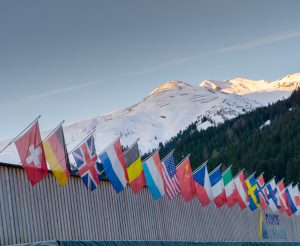Indonesia Night is a hot ticket at Davos. At this year’s bash, a crowd of 700 sampled regional delicacies like Medan fish from Sumatra and Taliwang chicken from Lombok. “The food will . . . be very good tonight,” promised Luhut Pandjaitan, a senior minister in President Joko Widodo’s cabinet. There were rumors that Tony Blair was in the room.
The World Economic Forum (WEF) is bullish on Southeast Asia. One of the buzzy acronyms circulating at the meet was VIP markets: namely Vietnam, Indonesia, and the Philippines. Yet most leaders from the Association of Southeast Asian Nations (ASEAN) chose to give the annual jamboree of global elites at Davos a miss. Only Ferdinand “Bongbong” Marcos Jr. of the Philippines brought a sizable contingent. Asia overall had a low-key showing, with only three heads of state or government out of the 52 who attended.
This year’s gathering at Davos, which began on January 16, was also missing a slew of marquee names who had attended in the past. In 2017, then Vice President Joe Biden, Xi Jinping, Theresa May, and Shakira were among the guests. China’s president delivered the keynote address. ASEAN was represented by Cambodia’s Hun Sen and Vietnam’s Nguyen Xuan Phuc, both regulars on the Davos speaker circuit. However, this year Hun Sen skipped the event, and Phuc resigned as president while the WEF annual meeting was in session.
Among Asian participants, there’s a feeling that the event is drifting away from its global agenda. Nikkei Asia referred to the meeting as “a eurocentric gathering.” After last year’s conference, Malaysian columnist Karim Raslan wrote, “How can it be a “World” Economic Forum when the concerns of Asia, which will contribute 60 percent of global growth by 2030, are disregarded?” The war in Ukraine is one of the areas of concern. Some ASEAN countries argue that sanctions against Russia are counterproductive. Hun Sen told a Davos audience last year, “Sanctions should be stopped because they don’t produce any benefits. Not only do poor countries suffer, even the countries that issued the sanctions are affected.”
Summit fatigue could be another reason for the absence of ASEAN leaders at Davos. Southeast Asia hosted a trio of conferences in November that arguably surpassed Davos in star power. The guest list for the G-20 summit in Bali included Biden, Xi, and German Chancellor Olaf Scholz. Biden also dropped in at the ASEAN summit and related meetings in Phnom Penh. U.S. Vice President Kamala Harris spoke at the APEC meeting in Bangkok, which Xi also attended.
On the sidelines of the ASEAN conference, WEF founder and Chairman Klaus Schwab persuaded the Philippines president to make the trip to Davos. Manila news media noted that Marcos was the only ASEAN leader in attendance. Rappler commented: “Perhaps other ASEAN leaders figured the frivolity of the event, or realized they can grow their economies robustly without having to hobnob with the Davos elite.”
The Davos connection has become “politically toxic” for world leaders in the post-COVID-19 era. “Its star is fading a bit. If you look at who’s coming, it used to be that there were really serious heavyweights. This year, there’s only one G-7 leader,” observed Zanny Minton Beddoes, editor-in-chief of The Economist. “But at the same time, I do actually think it’s useful. And it’s particularly useful in a world that is… fragmenting.”
Over a decade ago, a Brookings essay asked: “Are Davos Man’s Days Numbered?” The popularity of Indonesia Night might suggest otherwise. Yet for many in public office, the schmoozefest at the ski resort in the Swiss Alps no longer holds the same appeal.

































